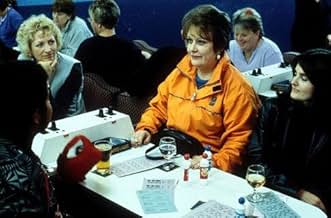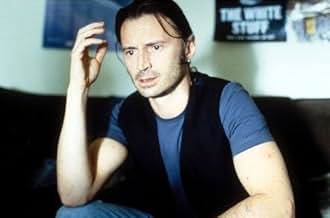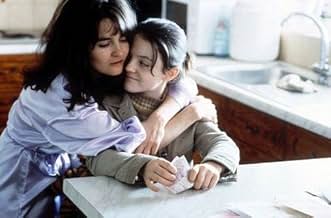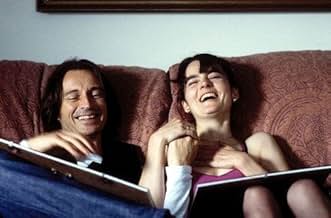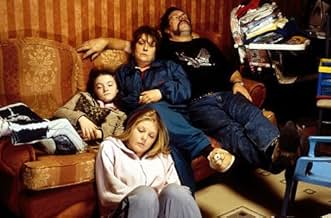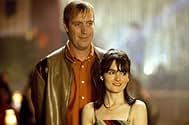IMDb रेटिंग
6.1/10
4.9 हज़ार
आपकी रेटिंग
अपनी भाषा में प्लॉट जोड़ेंAfter seeing his ex-girlfriend (Henderson) turn down a nationally televised marriage proposal, a small-time crook (Carlyle) returns to his hometown to try and win back her heart.After seeing his ex-girlfriend (Henderson) turn down a nationally televised marriage proposal, a small-time crook (Carlyle) returns to his hometown to try and win back her heart.After seeing his ex-girlfriend (Henderson) turn down a nationally televised marriage proposal, a small-time crook (Carlyle) returns to his hometown to try and win back her heart.
- पुरस्कार
- 3 कुल नामांकन
David McKay
- Dougy
- (as David Mckay)
फ़ीचर्ड समीक्षाएं
Firstly, let me say how much I like Shane Meadow's work (particularly 'A Room For Romeo Brass'). However 'Once Upon a Time in The Midlands' is, in my opinion, his weakest work to date. That's not to say it isn't a good film, it is, but somewhere along the line the Meadow's formula went wrong. It smacks of too much development, something Meadows complained about himself, almost as if Film Four wanted to bottle the distinctive spirit of his earlier work, mass produce it and sell it to the widest audience possible. The characters end up as caricatures and whereas previous Meadows films examined the wonderful humanity and quiet dignity inherent in everyday life this one ends up in danger of being patronising to its subjects. The title and tag line are great but I wonder if they weren't thought up before the actual story and at the expense of the film. I personally found the Western elements a little superfluous, the deluge of famous faces distracting (what on Earth are Reeves and Mortimer doing as clowns?!), and the Glasgow gangsters subplot unnecessary. Once these elements fall by the wayside however, as they do in the second half, the film settles down into telling a decent little story. The central love triangle comes to the fore and we actually begin to connect with the characters. All the performances are good but special mention must go to young Finn Atkins who is outstanding. If this is your first taste of Meadows then don't be put off, just know that there are better films in his back catelogue than this. The 2 disc DVD is worth investing in though as the extras include Shane's World and a really nice documentary on the film's promotional tour.
Brilliantly observed comic scenes of working class domestic life, reminiscent of Caroline Aherne's superb 'Royle Family' sitcom, provide the backdrop for an engaging comedy-drama. All the main actors turn in typically excellent, albeit unsurprising performances: Robert Carlyle does a variation on his Scottish psycho-crim (see 'Trainspotting'), Ricky Tomlinson plays another genial but feckless Scouser (see 'The Royle Family') and Kathy Burke does her no-nonsense council-house Cockney routine (see Kathy Burke). By far the best of the ensemble is Rhys Ifans as Dek. Dek is the most rounded of the comic characters, all of whom are neatly sketched out, not just by dialogue, but by carefully chosen background details. Look out for the hub caps and model car collection in Dek's house and the cases of 'Pot Noodle' in Charlie's loo (which also serves as his office). Assured direction, a well-paced script and some very funny jokes make for a satisfying if somewhat predictable watch.
When they appear on a daytime chat show, Dek surprises his girlfriend Shirley by proposing to her, only to have her say no. Shirley's ex and father of her daughter, Marlene, sees the show and leaves Glasgow with stolen money to try to reclaim her. His arrival in the one-horse town of Nottingham sparks a Western style stand off between Dek and Jimmy.
The third part in his trilogy is Meadow's most accessible film and his lightest in style. It is also likely to be FilmFour's swan-song now that it is packing up shop for good. The plot is basically a relationship drama but it is packed with enough nice touches to make it feel more than that. The mix of comedy and drama is good and the `tinned spaghetti western' feel to it manages to be clever and consistent without overpowering the film.
The story does dip in the final third however the comedy dries up and the central drama between Jimmy, Dek and Shirley comes to the fore. The other characters vanish and the subplot (Jimmy being chased by his ex-gang) just seems to stop for 30 minutes. This dip is still OK but it did feel like it had nowhere to go and was just treading water to fill out the running time.
Apart from this dip the film has much to enjoy. The comedy is good and realistic for the setting. The many characters make for a family feel rather than a simple love triangle tale and the western music and spaghetti clichés are used well without being forced down your throat. The film does also rest on several really good performances.
Ifans is absolutely great he manages to make Dek a cowardly clown but also very relateable and sympathetic. Add to this a good (if a little mousy) Henderson and a superb turn by Atkins and the main trio are brilliant. Carlyle doesn't work as well and his character is too obvious, changing when he has got his way etc, and doesn't grab attention in the way he can. Burke, Tomlinson and the various support cast are very funny but also very real. Cosmo is good and tough as always and gets plenty of surreal comedy (why do they keep stealing wholly inappropriate vehicles!?) and key a sharp eye out for a downright unusual cameo from comedy duo Vic Reeves and bob Mortimer.
Overall the parts don't all manage to come together but for the most part it is a great mix of comedy and drama carried off by some very good performances. However when the film focuses totally on the triangle at the centre it appears to run out of steam for a while and have little to do but wait for the final showdown.
The third part in his trilogy is Meadow's most accessible film and his lightest in style. It is also likely to be FilmFour's swan-song now that it is packing up shop for good. The plot is basically a relationship drama but it is packed with enough nice touches to make it feel more than that. The mix of comedy and drama is good and the `tinned spaghetti western' feel to it manages to be clever and consistent without overpowering the film.
The story does dip in the final third however the comedy dries up and the central drama between Jimmy, Dek and Shirley comes to the fore. The other characters vanish and the subplot (Jimmy being chased by his ex-gang) just seems to stop for 30 minutes. This dip is still OK but it did feel like it had nowhere to go and was just treading water to fill out the running time.
Apart from this dip the film has much to enjoy. The comedy is good and realistic for the setting. The many characters make for a family feel rather than a simple love triangle tale and the western music and spaghetti clichés are used well without being forced down your throat. The film does also rest on several really good performances.
Ifans is absolutely great he manages to make Dek a cowardly clown but also very relateable and sympathetic. Add to this a good (if a little mousy) Henderson and a superb turn by Atkins and the main trio are brilliant. Carlyle doesn't work as well and his character is too obvious, changing when he has got his way etc, and doesn't grab attention in the way he can. Burke, Tomlinson and the various support cast are very funny but also very real. Cosmo is good and tough as always and gets plenty of surreal comedy (why do they keep stealing wholly inappropriate vehicles!?) and key a sharp eye out for a downright unusual cameo from comedy duo Vic Reeves and bob Mortimer.
Overall the parts don't all manage to come together but for the most part it is a great mix of comedy and drama carried off by some very good performances. However when the film focuses totally on the triangle at the centre it appears to run out of steam for a while and have little to do but wait for the final showdown.
I generally like Shane Meadows, his honest writing and depiction of what early 21st century average life in Britain is actually like, is both appealing and refreshing.
This one (I re-watched after many years and seen all his later work) is just a bit of a tangled mess (hence my summary title). It was great to watch the great Kathy Burke in a dominant (yes!) role now that she's concentrating on theatre direction these days. Also, her screen hubbie, a rather ridiculous wannabe country singer in the shape of Ricky Tomlinson.
Robert Carlyle plays to form as a real piece of ***t who is after getting his ex back. I soon found his constant shouting, swearing and nastiness wearying and Ryhs Ifans' counter example, as poor Shirley Henderson's dopey, lily-livered 'boyfriend' equally annoying. I wanted to shout out loud 'forget them both', but this being drama, the opposite happens of course.
The lighter moments, I suppose were intended to punctuate this domestic misery with an air of humanity. But, most of the time, they look stupidly careless, leaving you unsure whether they were intentional, or not. I did like the overall premise, especially at the end, when the subversive comparison to the classic western becomes apparent, though the setting is a modern English city's housing estate over a hundred years later. The Sierra Cosworth being the equivalent of a wild stallion...?
Meadow's work, though, is always of much merit and the fact that he has gotten himself a niche and etched himself a position on that elite panel of independent Brit directors whose work is admired equally by critics and public alike, is to be much admired. It also means that this quite early offering from him is still above average.
This one (I re-watched after many years and seen all his later work) is just a bit of a tangled mess (hence my summary title). It was great to watch the great Kathy Burke in a dominant (yes!) role now that she's concentrating on theatre direction these days. Also, her screen hubbie, a rather ridiculous wannabe country singer in the shape of Ricky Tomlinson.
Robert Carlyle plays to form as a real piece of ***t who is after getting his ex back. I soon found his constant shouting, swearing and nastiness wearying and Ryhs Ifans' counter example, as poor Shirley Henderson's dopey, lily-livered 'boyfriend' equally annoying. I wanted to shout out loud 'forget them both', but this being drama, the opposite happens of course.
The lighter moments, I suppose were intended to punctuate this domestic misery with an air of humanity. But, most of the time, they look stupidly careless, leaving you unsure whether they were intentional, or not. I did like the overall premise, especially at the end, when the subversive comparison to the classic western becomes apparent, though the setting is a modern English city's housing estate over a hundred years later. The Sierra Cosworth being the equivalent of a wild stallion...?
Meadow's work, though, is always of much merit and the fact that he has gotten himself a niche and etched himself a position on that elite panel of independent Brit directors whose work is admired equally by critics and public alike, is to be much admired. It also means that this quite early offering from him is still above average.
Once Upon a Time in the Midlands seems to make naming your film 'Once Upon a Time in.....' seem like a bit of a gimmick. Indeed, a year earlier Robert Rodriquez was left floundering with his over the top, epic tail of mediocrity named 'Mexico' but 'Midlands' does not make the same mistakes and nor does it ever veer too far over the line of 'big budget television drama'. However, if it doesn't veer too far over the line that's not to say it does not veer over the line at all, because it does and truth is; 'Midlands' is a pretty ordinary film.
The film can either be a big budget TV drama or a small budget film; like I said, it becomes a little too much of the former for my liking and thus fails as an engaging and intriguing tail of love, loss and family values. In fact, what it ends up as is a story that comes; sticks around and then goes again with a disappointing anticlimax and a series of scenes that remain interesting given the situation but lack any atmosphere. The story revolves around a man, named Jimmy (Carlyle), as he returns to where he once lived upon seeing a live (those things are broadcast live?) daytime chat show in order to seek out the one he loved and fathered a child with she is Shirley (Henderson). Trouble is, times have changed and she has moved on; she's with Dek (Ifans), a well respected but somewhat eccentric mechanic. The problem is with this idea, albeit a brilliant one, is that Jimmy is shown as a far too good-a person to make us want to hate him and Dek is put across as a far too funny-a person to make us want to think he is up for the challenge; thus it is no surprise when the film meanders and wonders around in a bit of a daze.
It is true to say that the opening scene focuses on Jimmy as he lies there, lost and unhappy we feel; but he is then shown to be a bit of a lad; a bit of a criminal as he and three Glaswegian thieves steal a case of money from four clowns. Even then, we can empathise with the thief in Jimmy because the heist scene is funny and why would four clowns get out of a Ford Galaxy whilst carrying a case full of money? Whatever they did, it seems they might have deserved what they got. So, so far we have spent time with Jimmy: the film could have gone down two routes: 1; make him seem evil and give him antagonistic traits meaning that when he comes for Shirley, we will be wary of him. Or 2; do not show him at all so that the impact of this rough looking guy who has shown up wanting to be together with Shirley again is a jolt to the audience and character alike 'Midlands' does neither, it makes Jimmy look like an ordinary guy, like a 'lad'; harmless yet humorous.
But what the film does isn't necessarily bad, just a little out of place. On the flip side; Dek, at least to me, came off as a bit of an eccentric and out of sorts guy who did not embody the traits required if he was going to be a hero of any sorts. Consequently, any scene in which he and Jimmy face off or are put in a location together should be filled with tension as a perhaps evil, Scottish criminal and an upstanding but strong hero come face to face what we get is a misunderstood, comic Jimmy and a wimp of a hero Dek, in an office, having an anti-climatic square off. Secondly, Jimmy really could've been established as a psycho with a few scenes in which Jimmy is perhaps stalking Shirley or drawing attention to himself through anti-social and foreboding behaviour but what we get is a couple of silly scenes at his sister's house but a good scene when she tells him what's what, however that further deflates any menace about him because there and then, the 'villain' is beaten and by his own sister, too This shows us he is vulnerable.
So onto the supporting characters; the sister is Carol (Burke) who does a lot of shouting and screaming in that annoying accent Kathy Burke carries; her husband Charlie (Tomlinson) is an introduced but underdeveloped folk singer that doesn't have much to do; the girl in question the two leads are fighting for, Shirley, is a one dimensional character who speaks as if she has something stuck in her throat and just when the film's crucible gets interesting when the Glaswegians come back for Jimmy, they disappear after one failed ambush but don't worry, they're there at the end in time for a 'funny' scene on the motorway and the running joke that they steal every car they drive feels out of place. So, Once Upon a Time in the Midlands feels anti-climatic; it feels empty in its atmosphere and development of its already familiar characters and it certainly ends in a disappointing manner leaving you with a feeling of 'So, what was all that for?' When you are supposed to feel anger, suspense, joy, fear or anything else; you'll feel nothing and that is a shame as it was a good idea, just executed a little heavy-handedly.
The film can either be a big budget TV drama or a small budget film; like I said, it becomes a little too much of the former for my liking and thus fails as an engaging and intriguing tail of love, loss and family values. In fact, what it ends up as is a story that comes; sticks around and then goes again with a disappointing anticlimax and a series of scenes that remain interesting given the situation but lack any atmosphere. The story revolves around a man, named Jimmy (Carlyle), as he returns to where he once lived upon seeing a live (those things are broadcast live?) daytime chat show in order to seek out the one he loved and fathered a child with she is Shirley (Henderson). Trouble is, times have changed and she has moved on; she's with Dek (Ifans), a well respected but somewhat eccentric mechanic. The problem is with this idea, albeit a brilliant one, is that Jimmy is shown as a far too good-a person to make us want to hate him and Dek is put across as a far too funny-a person to make us want to think he is up for the challenge; thus it is no surprise when the film meanders and wonders around in a bit of a daze.
It is true to say that the opening scene focuses on Jimmy as he lies there, lost and unhappy we feel; but he is then shown to be a bit of a lad; a bit of a criminal as he and three Glaswegian thieves steal a case of money from four clowns. Even then, we can empathise with the thief in Jimmy because the heist scene is funny and why would four clowns get out of a Ford Galaxy whilst carrying a case full of money? Whatever they did, it seems they might have deserved what they got. So, so far we have spent time with Jimmy: the film could have gone down two routes: 1; make him seem evil and give him antagonistic traits meaning that when he comes for Shirley, we will be wary of him. Or 2; do not show him at all so that the impact of this rough looking guy who has shown up wanting to be together with Shirley again is a jolt to the audience and character alike 'Midlands' does neither, it makes Jimmy look like an ordinary guy, like a 'lad'; harmless yet humorous.
But what the film does isn't necessarily bad, just a little out of place. On the flip side; Dek, at least to me, came off as a bit of an eccentric and out of sorts guy who did not embody the traits required if he was going to be a hero of any sorts. Consequently, any scene in which he and Jimmy face off or are put in a location together should be filled with tension as a perhaps evil, Scottish criminal and an upstanding but strong hero come face to face what we get is a misunderstood, comic Jimmy and a wimp of a hero Dek, in an office, having an anti-climatic square off. Secondly, Jimmy really could've been established as a psycho with a few scenes in which Jimmy is perhaps stalking Shirley or drawing attention to himself through anti-social and foreboding behaviour but what we get is a couple of silly scenes at his sister's house but a good scene when she tells him what's what, however that further deflates any menace about him because there and then, the 'villain' is beaten and by his own sister, too This shows us he is vulnerable.
So onto the supporting characters; the sister is Carol (Burke) who does a lot of shouting and screaming in that annoying accent Kathy Burke carries; her husband Charlie (Tomlinson) is an introduced but underdeveloped folk singer that doesn't have much to do; the girl in question the two leads are fighting for, Shirley, is a one dimensional character who speaks as if she has something stuck in her throat and just when the film's crucible gets interesting when the Glaswegians come back for Jimmy, they disappear after one failed ambush but don't worry, they're there at the end in time for a 'funny' scene on the motorway and the running joke that they steal every car they drive feels out of place. So, Once Upon a Time in the Midlands feels anti-climatic; it feels empty in its atmosphere and development of its already familiar characters and it certainly ends in a disappointing manner leaving you with a feeling of 'So, what was all that for?' When you are supposed to feel anger, suspense, joy, fear or anything else; you'll feel nothing and that is a shame as it was a good idea, just executed a little heavy-handedly.
क्या आपको पता है
- ट्रिवियाDek (Rhys Ifans) drives a car with a vintage Welsh number plate from the late fifties, the letters of which read "DEK". It was issued in Haverfordwest, the birthplace of Rhys Ifans.
- क्रेज़ी क्रेडिटSpecial thanks to ... the People of Carlton and Gedling, Nottingham ...
- साउंडट्रैकFeels Like I'm in Love
Written by Ray Dorset
Published by Sony/ATV Music Publishing, Ltd. / Associated Music International, Ltd.
Performed by Kelly Marie
Courtesy of Eliot Cohen (as Eliot M. Cohen) of Satellite Music, Ltd.
टॉप पसंद
रेटिंग देने के लिए साइन-इन करें और वैयक्तिकृत सुझावों के लिए वॉचलिस्ट करें
- How long is Once Upon a Time in the Midlands?Alexa द्वारा संचालित
विवरण
- रिलीज़ की तारीख़
- कंट्री ऑफ़ ओरिजिन
- आधिकारिक साइट
- भाषा
- इस रूप में भी जाना जाता है
- Érase una vez en los Midlands
- फ़िल्माने की जगहें
- उत्पादन कंपनियां
- IMDbPro पर और कंपनी क्रेडिट देखें
बॉक्स ऑफ़िस
- बजट
- £19,50,000(अनुमानित)
- US और कनाडा में सकल
- $1,72,564
- US और कनाडा में पहले सप्ताह में कुल कमाई
- $21,475
- 31 अग॰ 2003
- दुनिया भर में सकल
- $5,44,512
- चलने की अवधि1 घंटा 44 मिनट
- रंग
- ध्वनि मिश्रण
- पक्ष अनुपात
- 2.35 : 1
इस पेज में योगदान दें
किसी बदलाव का सुझाव दें या अनुपलब्ध कॉन्टेंट जोड़ें

टॉप गैप
By what name was Once Upon a Time in the Midlands (2002) officially released in India in English?
जवाब






